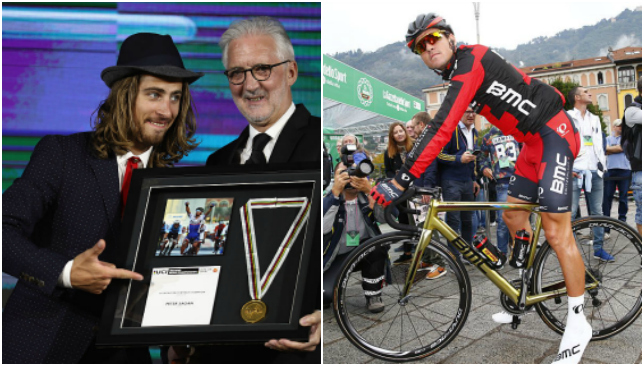
Brian Cookson, the president of cycling’s world governing body (UCI), is optimistic about the growth of the passion for the sport in the Middle East and believes more fans will start to embrace it in the future.
The Arabian Gulf region is becoming more and more relevant in global cycling but residents are yet to fully embrace the culture of the sport, with few fans turning up to the races taking place here.
The Road World Championships wrapped up in Doha, Qatar a week ago, while the Abu Dhabi Tour, which concludes its second edition on Sunday night at Yas Marina Circuit, will be a WorldTour event next year, joining the Tour of Qatar as races in the region with top-flight status.
There will be four men’s events in a row staged in the Gulf in February 2017, starting with the Dubai Tour – which has been extended to five stages instead of four – followed by the Tour of Qatar, the Tour of Oman and finally the Abu Dhabi Tour.
More fans took to the streets to cheer on the riders last weekend in Abu Dhabi compared to last year – although the numbers are still low – while reports from the World Championships in Doha last week noted a serious lack of spectators.
Cookson acknowledges that spreading the culture of cycling will take time and insists Doha was a success.
“I understand that there is no culture really of standing on the side of the road watching a sporting event, that’s not surprising when the temperature is so hot, it’s just not part of what people do,” Cookson told Sport360 at the UCI Cycling Gala at the St. Regis Hotel last week.
“But I think a lot of effort was put into attracting people and in the final weekend, and the men’s race in particular, there was a good crowd there.
“The important thing as well is it’s not just about the people who are there on the day, it’s about the television audiences and the images that are projected around the world and I think everyone did a great job in that respect.
He added: “We are very keen to keep working with the people here in Gulf to help them promote cycling in whatever way we can. Obviously the cultural differences are strong but we can overcome those and there’s a massive amount of interest in cycling in the Gulf now.”
Stage 4 about to get underway #RideToAbuDhabi #yasmarinacircuit #AbuDhabiTour pic.twitter.com/qNiqXQGTi3
— Reem Abulleil (@ReemAbulleil) October 23, 2016
Olympic gold medallist, Greg van Avermaet, describes the lack of fans in the streets at the World Championships as “strange”. The Belgian however feels it is not a permanent situation and has his own ideas on how to improve it.
“It’s always important to have the fans, I think cycling is a sport where cyclists are really close to the people and they can almost touch us when we’re on the bikes. I think that’s a big advantage that we have that we’re close to the fans and I think this sport has to get more popular here just by doing it and people seeing it I think,” Van Avermaet said.
“I was a few years in Oman and we had some good spectators there. It helps also to race a little bit more on a circuit, then the fans get to see the riders several times (while standing in the same place).
“At a football stadium it’s easy, you just pay and you see the whole game. The problem with cycling it that it’s a long distance and most of the time it’s like a sprint, so it gives only a few seconds for the people who are there to see us, and that’s a little bit a disadvantage in cycling.
“But if we do a few circuits, you can feel a little bit the atmosphere and what’s going on, they can see the speed we’re making. So I think cycling also has to work on that and spectators would also come here.”
Some may find it surprising that Abu Dhabi joined the WorldTour calendar in just its third edition but Cookson feels the work done in the UAE capital justifies such an upgrade.
“They’ve invested in infrastructure, events and people, we’ve seen now the second edition of the Abu Dhabi Tour, we’ve seen this UCI Gala organised for the second time very very successfully,” he said.
“Lessons are being learned all the time, people are interested in investing not just in events but in sponsoring teams from this region. That’s a good thing.
“We want to of course protect the heritage of cycling with the big races in Europe but there’s room in the calendar for some development in this part of the world as well and that’s what we’re trying to encourage.”